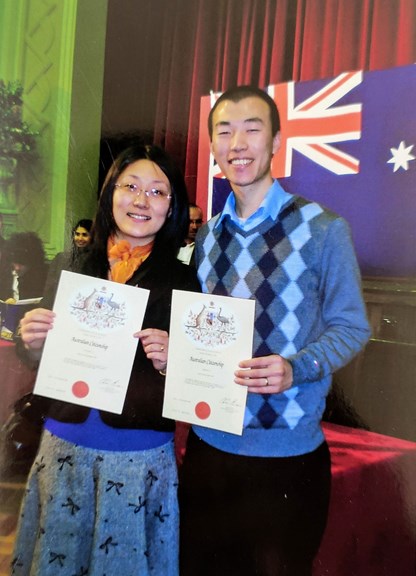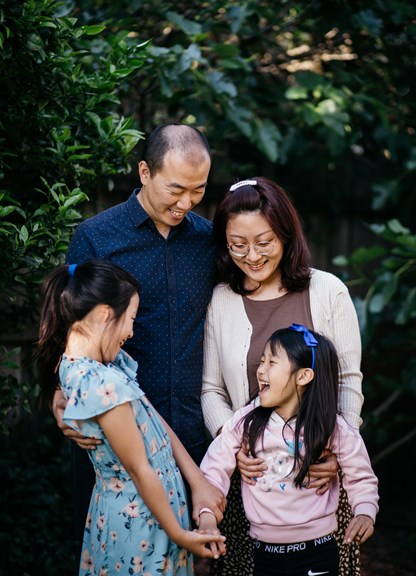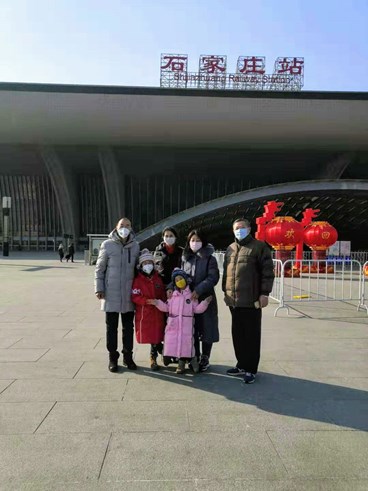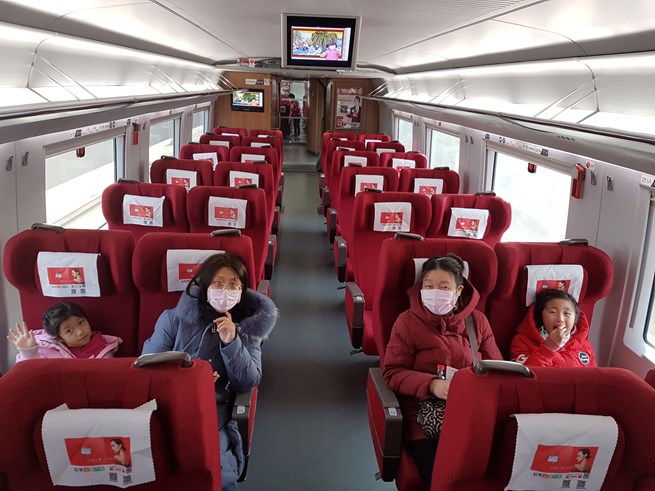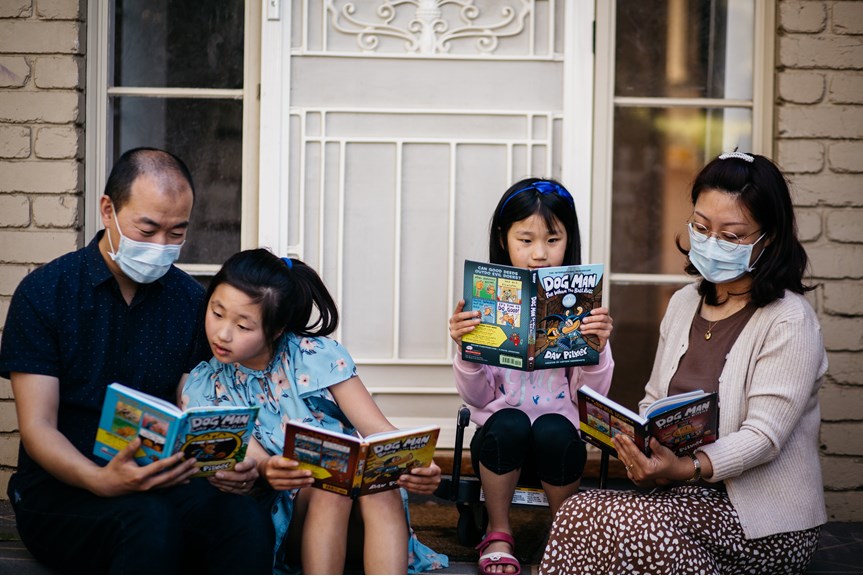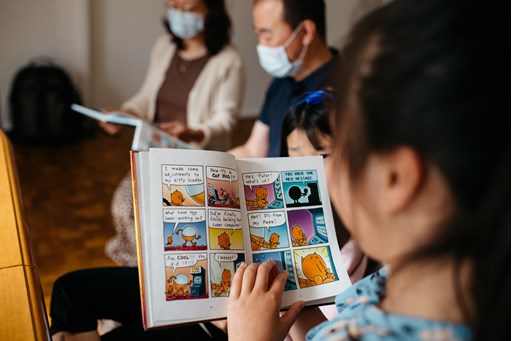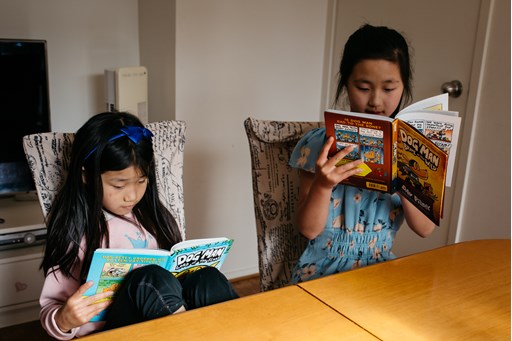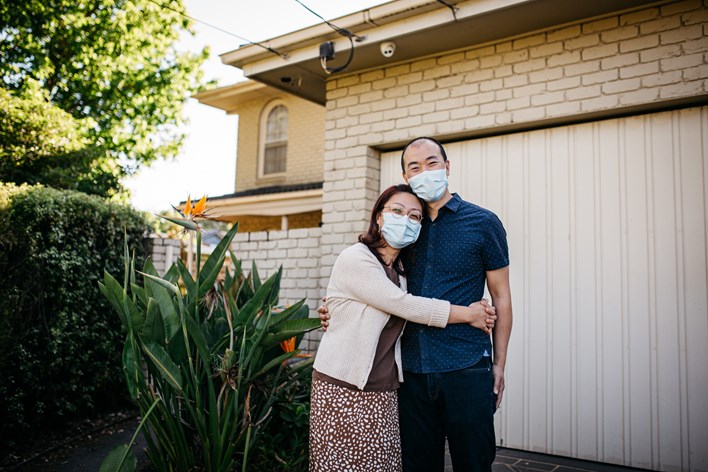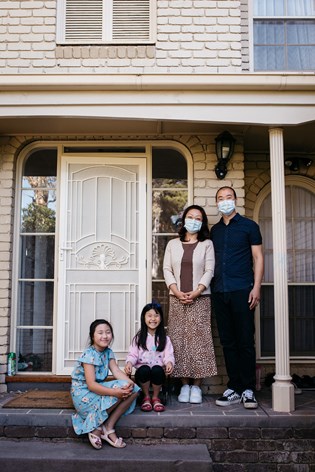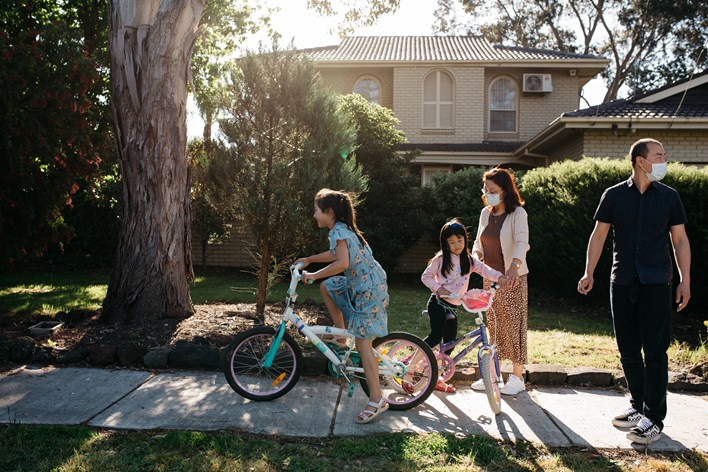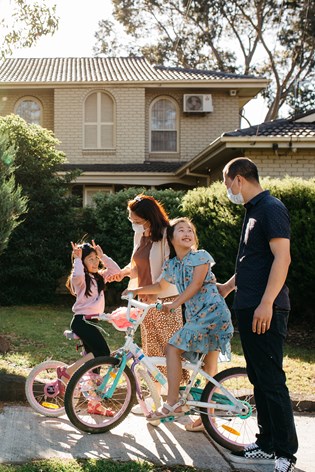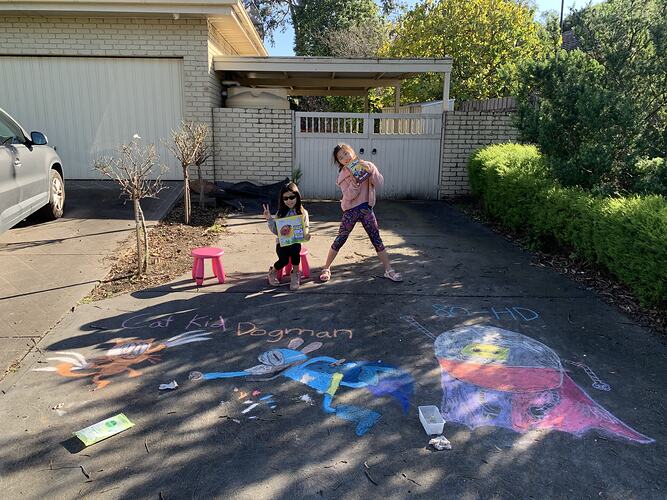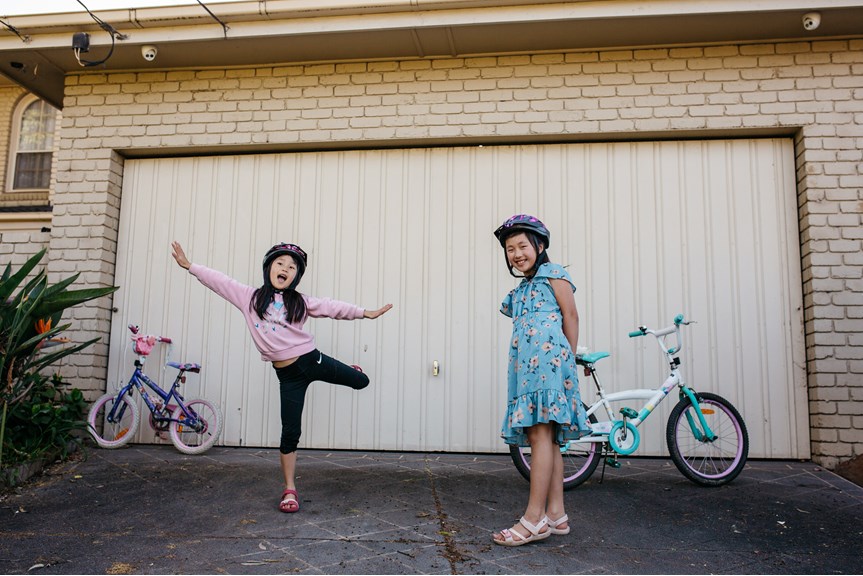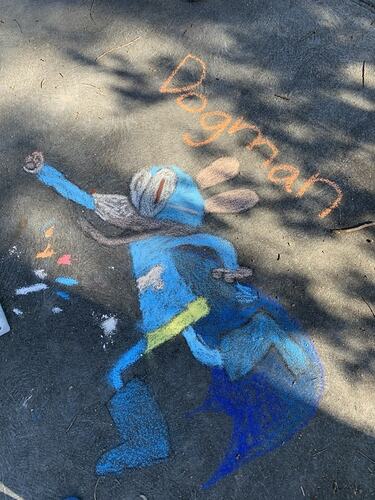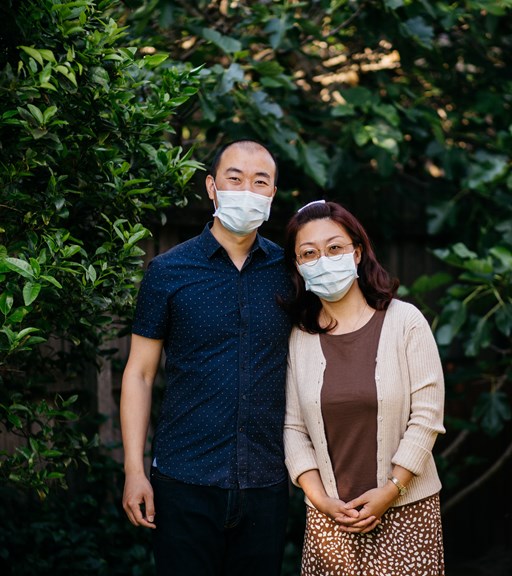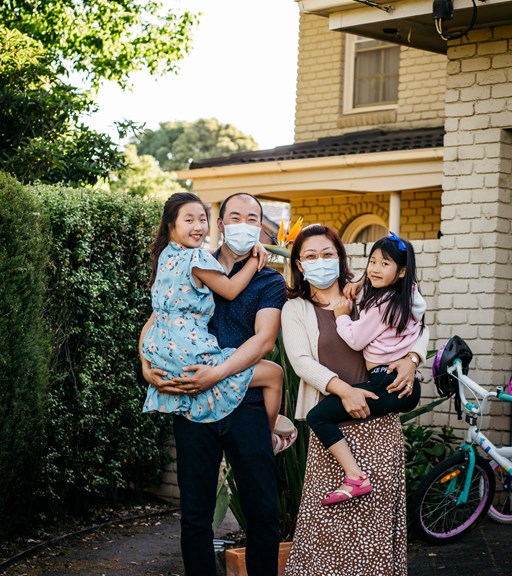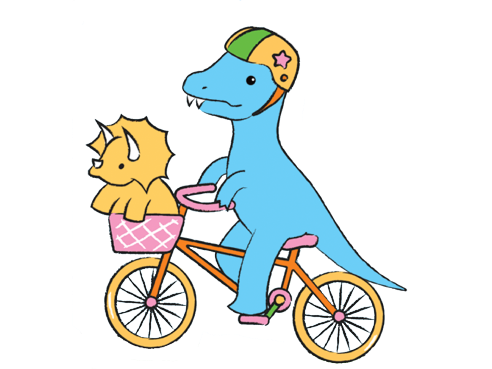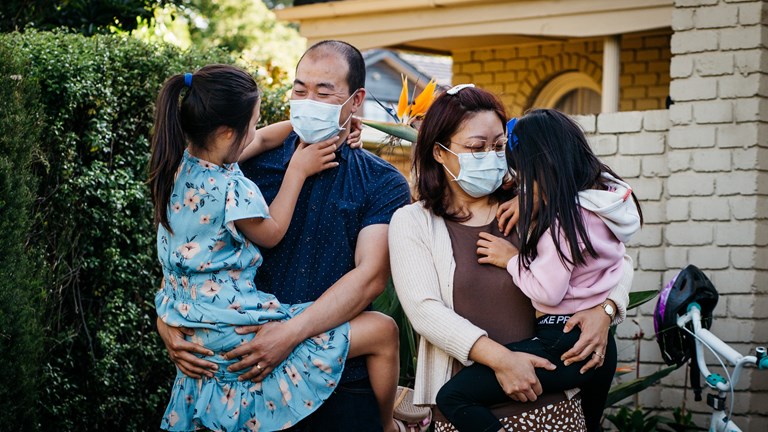
The Li Family
Neighbourhood Connections
In January 2020, when Zheng and Grace Li took their daughters Elizabeth and Esther to China for the very first time to meet their grandparents and celebrate Chinese New Year, they couldn’t have imagined they would suddenly find themselves at the epicentre of an emerging pandemic, one that would affect the lives of millions.
Since migrating to Melbourne from Hebei in Northern China in 2005, the Li family have found a welcoming community and support network in their home suburb of Glen Waverley.
Their 2020 trip to China was one that they had been looking forward to – a special holiday that would allow the children to connect with family, and learn more about their Chinese heritage and culture.
‘I had not been back to my hometown in China for about thirteen years,’ says Zheng. ‘When we arrived in January, there had not been much information about coronavirus.’ As the days went by, Zheng and his family started noticing restrictions and closures being put in place. There was a lot of fear and uncertainty growing. ‘The situation seemed to be changing every day, even every few hours,’ Zheng recalls. ‘No one knew what was really going on.’
When the government declared that restaurants around China would be closing their doors over the New Year, Zheng’s family, along with countless others, had to cancel their bookings and celebration plans for the big feast. ‘It was quite disappointing as I had physically not seen my extended family for more than a decade,’ Zheng remembers.
The situation quickly escalated and China went into hard lockdown. The Li family had been there all of four days.
There were initials concerns that Zheng and his family wouldn’t be able to get back to Australia, but thankfully they were permitted to board their return flight and landed back in Melbourne on February sixth. The family went straight into a strict fourteen-day isolation period in their Glen Waverley home.
‘It was challenging for those two weeks as I believe we were the first group who may have experienced such a situation,’Zheng Li
He recalls that although a small number of his colleagues knew how serious the situation was, most people at that time had yet to really think of COVID-19 as the national and global catastrophe it would soon become.
During the Li family’s initial period of self-isolation, neighbours and the local community banded together to help to support Zheng, Grace, and the two girls. ‘There was a group of friends who offered grocery shopping,’ says Zheng. ‘A group of volunteers helping us with the daily essential shopping.’ It was a great comfort to the family to feel supported by and connected to their community at such a challenging and uncertain time.
On March 16, little more than a month after the family finished self-isolating, Victoria declared a state of emergency and shortly afterwards a state-wide lockdown began. By this point, Zheng and Grace recall, ‘some restaurants started to offer food delivery’ and there was a better-established online shopping system from the big retailers. However, lockdown still had its difficulties.
‘It was very hard at the beginning of lockdown for the kids as they missed their friends and teachers very much,’ Zheng explains. ‘It’s also been quite challenging for them to learn remotely. The children must have self-discipline to manage the study time and workload while we would get used to the challenge of helping the children [while] doing our normal tasks in routine.’ Yet like families all across Victoria, the Li family adapted their lifestyle and routine to embrace the difficulties facing them.
‘As the time went by, the kids became more familiar and comfortable with the online communication tools […] that the school had been using to interact with them,’Zheng Li
‘We have also managed Zoom parties for the kids, celebrated a few birthday parties and attended online church activities.’ Zheng and Grace’s young girls, Esther and Elizabeth, also rose to the occasion, handwriting letters and making handcrafts to post to friends. Zheng recalls that it was initially an ‘unusual experience as people got together and sang Happy Birthday online in the early stages of Covid-19. ‘After that,’ he says, ‘we entered the new norm to have regular Zoom parties for birthdays and catch-ups.’
While the kids used to go to playgrounds in the afternoons, Esther and Elizabeth replaced these with activities they could do closer to home. ‘One of the highlights were more family times,’ says Zheng. ‘Rather than going to a road trip or visiting different places, we stayed together to enjoy family movie nights, family exercise times, reading times, bike riding and bible study.’
Covid-19 has seen people all over the world turning to their favourite books for comfort and entertainment. Esther and Elizabeth particularly enjoyed reading the much-beloved Dog Man series by Dav Pilkey of Captain Underpants fame. Elizabeth explains, ‘Dog Man is a very funny and interesting story. I love the story so much. I thought everyone else would like it too. They [neighbours] would smile at it when they walk past.’
The art and graphics of Dog Man became an inspiration for Elizabeth and younger sister Esther’s chalk drawings. With Melbournians unable to leave their 5km radius for over three long months, many children connected with their neighbours and communities in heart-warming and ingenious ways.
Chalk drawings could be found on the pavements and roads, along with teddy bears and other soft toys displayed in windows. Spoonville has been one such craze, whereby villages of decorated, dressed-up wooden spoons appear in clusters around neighbourhoods. Such emblems of community spirit and creativity have been important ways for children to feel social connection deprived of in lockdown, especially being apart from their school friends and extended families.
The Li girls got the idea for making their own chalk drawings during walks in nearby parks and streets. They ordered some coloured chalk from Bunnings and teamed up with Mum, Grace, to illustrate their driveway with Dog Man characters, as well as hearts and other symbols of love and hope.
They delighted in surprising dad Zheng with their creations when he returned from work each day, even telling him to park in the street instead of in the driveway. For Zheng, the girls’ art was continuing source of warmth and encouragement.
‘I believe it has been very good to have such beautiful chalk painting on the driveway,’ he says.
'We could see the big smile on the faces when people stopped there watching. At least, it was one of the inspiring things we did for ourselves and the local community.'Zheng Li
Zheng’s youngest daughter Esther, was especially enthusiastic about this newfound hobby commenting, ‘I enjoyed helping my sister with the drawing. And I like to make the neighbours happy.’
Another lifeline for the Li family has been their connection to the local church community. Zheng expresses how important and consoling it was that church activities were offered online, and he hopes the online offer continues to benefit ‘more people seeking Christian faiths and [allowing] more flexibility’.
Elizabeth and Esther likewise found solace in their faith. They frequently exchanged cards and letters with their friends from the Crossway Baptist Church. Zheng describes how ‘bible verses were also included in the kids’ letters’, as a way of supporting and encouraging each other.
What has organically emerged from these extraordinary times of tough lockdowns and self-isolation, are new traditions that families such as Zheng and Grace’s would like to see continued in the future. Although people have been forced to keep apart physically, new and meaningful connections and friendships have been able to flourish at a distance.
‘We appreciate all the supports around us,’ the Li family affirm. ‘The Bible teaches us to love our neighbours, we receive their love and continue to pass the love and care around the community. Our family and health become more important in this challenging time. We are grateful to enjoy the freedom of travel once the restriction is lifted.’
With the support of the Office for Suburban Development, a series of photographs, greeting cards and chalk donated by the Li Family have been acquired into Museum Victoria’s State Collection. These items will provide a lasting reminder of the various ways that families experienced self-isolation after returning home from overseas, as well as the creative ways that children became involved in neighbourhood activities, such as chalk drawings, during COVID-19 lockdowns.
This story was collected by Catherine Forge and Moya McFadzean and written by Charlotte Callander in collaboration with the Li Family.
